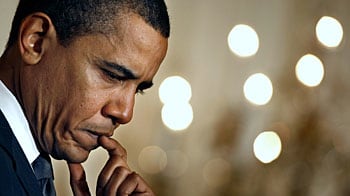
James Carville coined the slogan “it’s the economy, stupid,” in 1992 and the phrase, along with two others—“change vs. more of the same” and “don’t forget health care”—became the roadmap for defeating the first President Bush. As a student of the then-cutting edge 1992 Clinton campaign, I held a viewing of the film The War Room, a documentary about Carville and his colleagues, for my staff when I was appointed communications director for President George W. Bush’s re-election effort in 2004. Soon, I had my own slogan. I scribbled “it’s the hypocrisy, stupid” on a piece of paper and taped it to my door. This was the foundation of our case against Sen. John Kerry, and with a heavy assist from the senator from Massachusetts, the line of attack proved lethal.
Obama can’t ask for a clean spending bill without earmarks? No American president is that impotent, and certainly not this one.
As I watched President Obama yesterday, I was reminded more of my slogan than Carville’s. Obama’s decision to sign the $410 billion spending bill with $7 billion of pork-barrel spending projects—or “earmarks”—into law is one he will ultimately regret. Obama’s spokesmen were sent out with lame excuses about how the bill was “last year’s business” and there wasn’t much Obama could do to fix it. Give me a break. This is a president who shut down Gitmo with the flourish of his signature. He has transformed America’s reputation around the world with his kind eyes and gentle smile. He moves mountains. But he can’t ask for a clean spending bill without earmarks? No American president is that impotent, and certainly not this one.
Obama allies argue quietly that the public doesn’t care about earmarks, but Team Obama made a political calculation for which they will pay a hefty price in credibility over the long term if they continue along this path. I’m not under the delusional belief that the public will wake up next week and suddenly know the difference between an earmark and a kumquat. They won’t. If earmark reform was something that the public understood well enough to hunger for, John McCain would be our president. In fact, this week’s debate reminds me of the challenges we faced last year when we ran against hope, change, and history with earmark reform, fiscal discipline, and bipartisan compromise.
Most people who have spent time in our nation’s capital would agree that the toughest things to change in Washington are the bad practices supported and practiced by members of both parties and the bad practices that are difficult to explain. Earmarks fall into both categories. This political reality surely figured into the White House decision to reverse course on a campaign pledge to end the seedy practice of stuffing hometown pork into spending bills. (Interestingly, Obama’s broken promise about participating in the public financing of presidential campaigns falls into the “difficult to explain” category as well, which may offer an additional explanation to that reversal.)
While his weak statement Tuesday on earmark reform represents a missed opportunity, Obama probably won’t pay a price for his actions in the near term. There are too many other issues on the minds of Americans facing fears of unemployment, foreclosure, and depleted savings for retirement and college. My hunch is that he will continue to float on a wave of historically high public-approval numbers that reflect both the depth of public support that he enjoys and the latitude that the public is willing to give him.
But his actions this week represent an unnecessary withdrawal from the goodwill account that the American people have entrusted him with. His refusal to take a stand against members of both parties on the issue of earmarks shows weakness. His unwillingness to follow through on the very things that made Americans hope Obama would change Washington’s most corrupt and deeply entrenched ways must be a disappointment to some of his supporters.
The reversal on earmarks also feeds a damaging narrative for the Obama team. His senior adviser, David Axelrod, is a student of the Bush years. He believes that campaigns are won by the candidate that represents a “remedy” to their predecessor’s weaknesses. If Obama offers additional examples of his willingness to reverse course on the change agenda he ran on, he’ll make his opponent the remedy to his own hypocrisy.
Nicolle Wallace served as a senior advisor to the McCain-Palin campaign from May to November 2008. She served President George W. Bush as an assistant to the president and director of communications for the White House, as well as communications director for President Bush's 2004 campaign.





